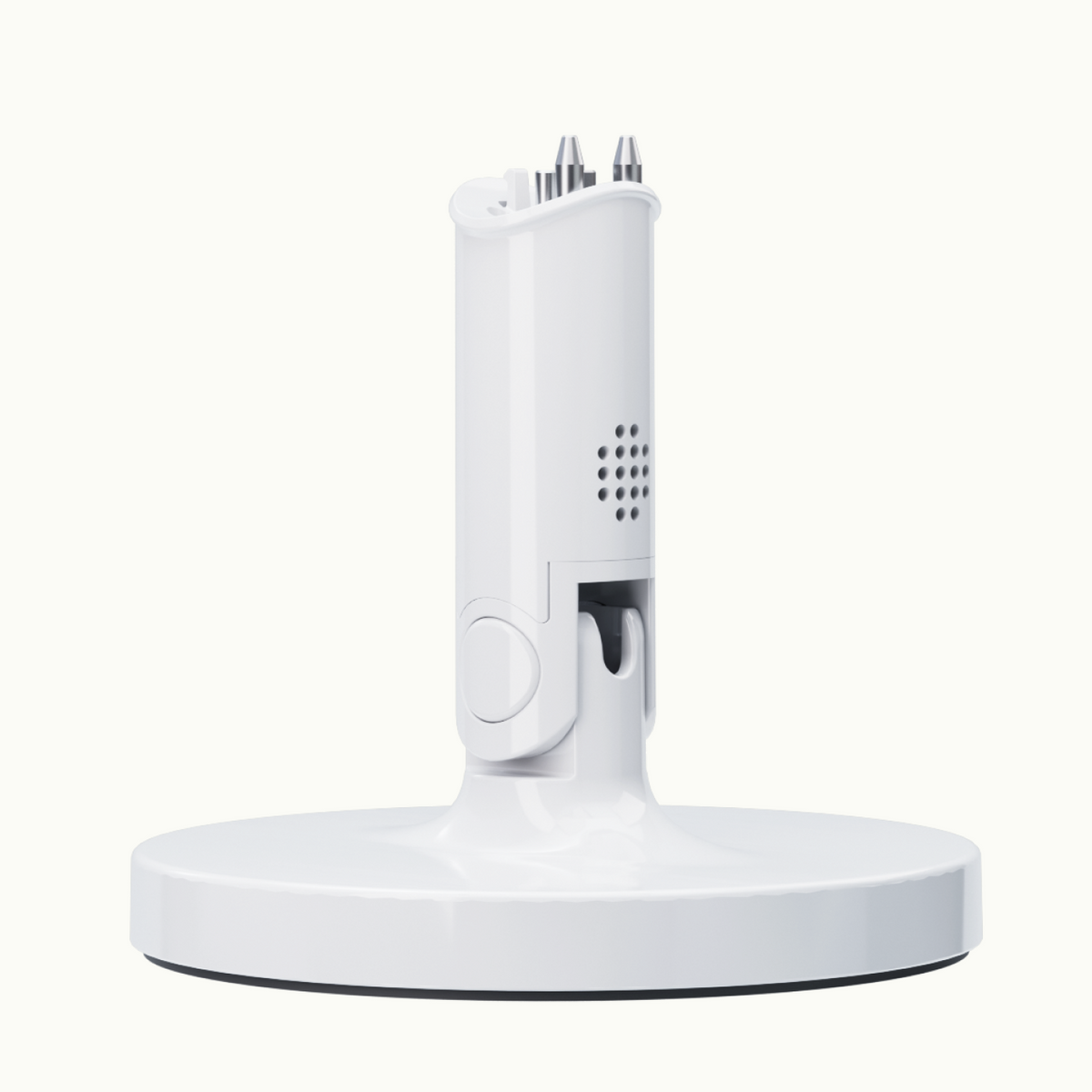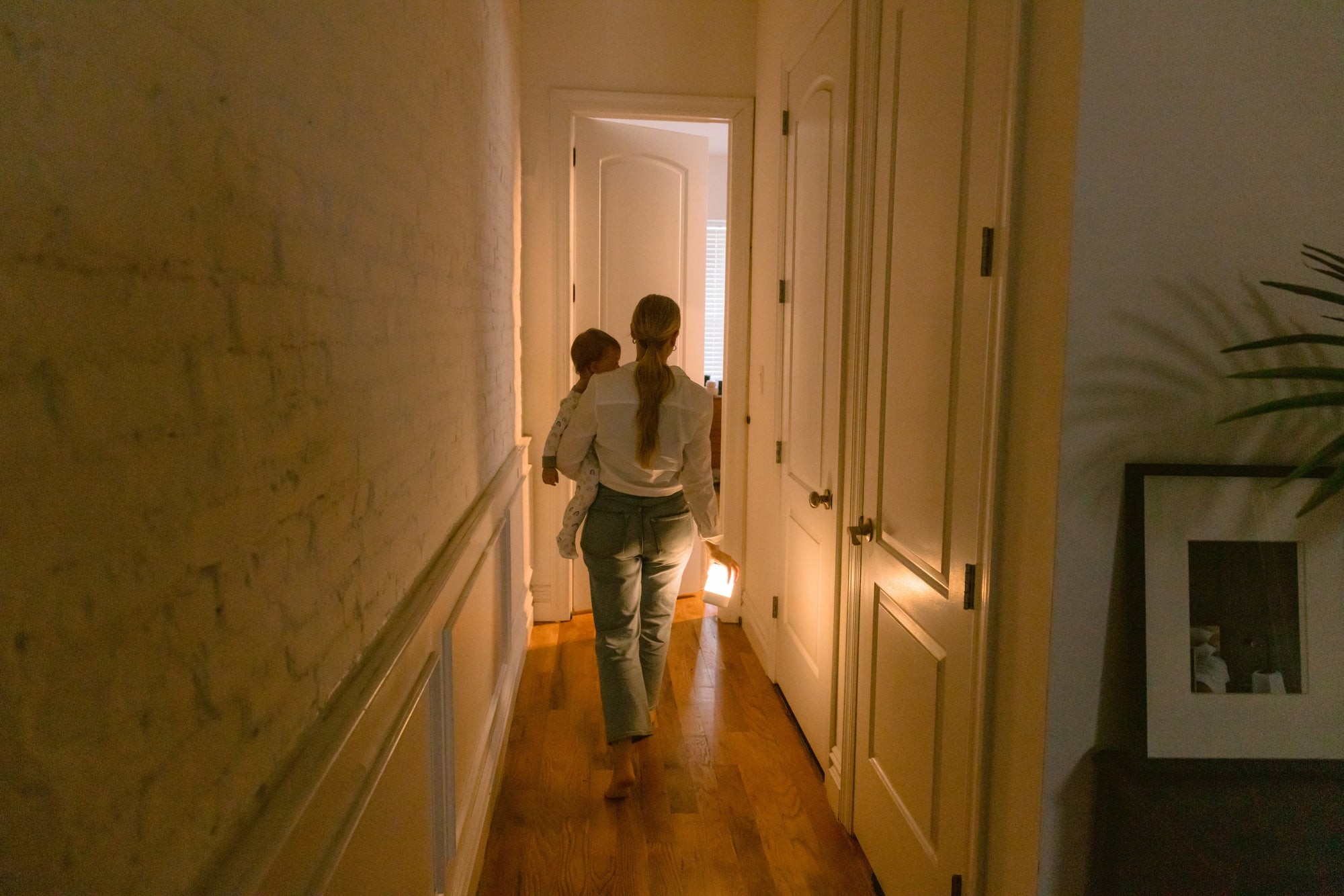If we had a genie’s lamp, “better sleep for everyone in the family” would definitely be at the top of our wish list.
But until that magical day arrives, we did the next best thing. We spoke to a real-life newborn sleep whisperer – Ingrid Prueher, a pediatric sleep consultant, lactation counselor and founder of BabySleepWhisperer.com. She’s a former Wall Street analyst who became a sleep aficionado after the birth of her second son. He kept waking up every few hours at night, so Prueher used her love of data and research to get him in a good bedtime routine. Now she’s on a mission to help families around the country get in tip-top sleep shape too.
Prueher uses a “five-layer cake” approach. That means laying a solid sleep foundation and then applying a training method, aka the icing. With a little groundwork, good sleep can become a reality.
“My youngest client has been a day old and my oldest client has been 71 years old,” Prueher says. “It’s never too late to get healthy sleep habits in your life and make sleep a priority.”
Here are some of her tips for cracking the code to a better night’s sleep for your newborn.
1. Go back to square one.
Baby’s cranky during the day, waking up multiple times during the night and can’t fall asleep without you. To get sleep back on track, Prueher says to start from scratch. Concentrate on sleep for a good two weeks like when baby first came home from the hospital. Use that time to get nap and feeding times running smoothly, perfect the nursery and eliminate negative sleep associations, like being rocked or fed in order to fall asleep.
“In their first three months of life, you want to help them transition from the womb into our world. After that point, if your child has never slept well, start with some basics,” Prueher says. “Treat it like you’re back to newborn days where you stayed home and focused on all of these things.”
That doesn’t mean never leaving the house or taking an extended staycation. But you might have to press pause on play dates and limit baby’s jam-packed schedule until they’re sleeping through the night. Because baby’s first and second naps are so mentally and physically restorative, Prueher suggests saving errands until second nap is over.
“Change your mindset and make sleep a priority, so you can find what the natural rhythm of the child is,” she says.
2. Know thy baby.
Perhaps it’s no surprise that Prueher is a huge fan of analytics! She recommends taking note of everything surrounding sleep, from diet to mood, then looking for trends in the data. Knowledge is power when it comes to figuring out your baby’s best sleep. Be on the lookout for clues. For example, if baby’s really happy, then starts staring off into space, it may be a way of saying, “Hey guys, I wanna go to bed!” Watch for signs of sleepiness like heavy eyes, redness in the face and even hyperactivity.
“Things like tugging on their ear, yawning a lot and starting to get cranky means the child is starting to get in an overtired state,” Prueher says. “But parents aren’t necessarily going to know that right away, so I want them to start logging it because then they start learning.”
3. Designate a sleep zone.
Life is unpredictable, but baby’s sleep shouldn’t be. Until your child’s in a good place sleep-wise, limit zzz’s to one area of the house, like the nursery. No napping wherever baby’s heart pleases. No dozing off in Mom’s arms or the stroller.
“Just for reset purposes, I don’t recommend having the child sleep everywhere,” Prueher says. “Give them a place to rest. A true place to rest. They will become more flexible later on once you teach them to actually sleep.”
4. Make sleep a team sport.
Setting up a routine and establishing positive visual and verbal sleep cues (pulling down the shades, reading a book, coming up with a catchphrase like “It’s time to go to bed!”) are great. But none of it will matter if Mom follows one routine at night, the nanny follows a different one during the day and Grandma does her own thing on the weekends. Get everyone in on the sleep plan – yes, even Grandma! – so that baby’s not caught off guard.
“Anyone who takes care of the child at the parents’ home should be on the same page. You don’t want to do different things because you’re only confusing the child,” Prueher says. “It’s not about everything being exactly the same every single day all day long, but there’s got to be some predictability.”
5. Don’t underestimate the power of milk.
Milk matters. It really, really matters, even when baby starts eating solids around four to six months. They’ll need less milk as they get older. But if baby’s still waking up in the middle of the night to feed, it could mean they’re not getting enough milk during the day.
“A lot of what I see, especially after the doctor has given the okay for the child to start having solids, is that parents just jump into the solids way too fast,” Prueher says. “The child will get to the point where they just eat solids all day long, but then look for milk all night long.”
They might be looking for more than just milk, though. Multiple nighttime wakeups may also indicate a negative sleep association.
“If a child has 10 ounces typically and when they wake up at night they only have two or five ounces, you know they’re not waking up to feed, they’re waking up out of habit,” Prueher says. “And that’s because a sleep association is there – ‘feed to sleep.’”
Prueher advises taking note of how many ounces baby normally consumes or how long they breastfeed, then comparing that to their feeding rituals at night. That’ll help determine if the behavior is driven by a need for milk or a need for you.
6. Practice what you preach.
Infants are like small, very cute detectives. They can tell when parents are wishy-washy about sleep or don’t mean business. “Think about the people you trust in your life,” says Prueher. “They mean what they say and they follow through.”
As babies get older, they could even be affected by your own not-so-great sleep habits. If you don’t take sleep seriously, why should they? “Children learn visually, they will pick up on it,” Prueher says.
7. You do you.
Every baby is different with varying sleep needs, cues and habits. Prueher’s first son was a “stellar sleeper.” Her second son? Not so much. That’s why it’s important to figure out what’s best for baby and you. Even if that means ignoring tips from your well-meaning next-door neighbor.
“When you get advice, you have to take it with a grain of salt,” Prueher says. “It’s all about finding what works for your child.”
If you still need tips for getting your baby to sleep, the Nanit baby monitor offers customized sleep tips based on your child’s sleep patterns. It’s like having a sleep expert in your home.






